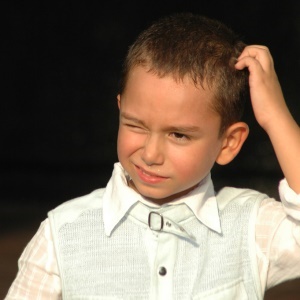
Like millions of other parents, you’ll probably know all about head lice infestation and how exasperating it is to watch your child’s scalp scratching antics. However, if your own scalp suddenly starts itching even though there’s no sign of those nasty, pin-sized parasites that feed off human blood, it’s another issue altogether!
Strange scalp itch
Psychosomatic or psychogenic itch is a poorly understood affliction that can occur even though there’s no physical cause for the itch. However, while scientists describe it as “an excessive impulse to scratch, gouge or pick at normal skin due to possible psychological abnormalities”, they admit this “complex interaction between the skin and the brain is poorly studied”.
Read: Stress can make you itch
It’s believed the strange scalp itch is linked to a problem at a point along the sensory (afferent) pathway that moves impulses to and from different areas inside the central nervous system.
‘Scratch reflex’
All people sometimes experience an itching sensation and the urge to scratch explains Johannesburg clinical psychologist Shai Friedland, because “an initial stimulus ignites sensory neurons in our nervous system”.
Read: What makes you scratch that itch
He says one unconfirmed theory is that “observing someone scratching causes neurons to fire in the same body part of the viewing individual, inducing the same sensation”.
“This means if you see someone with head lice infection scratching their scalp, it can subconsciously cause a ‘scratch reflex’ that makes you feel an itching sensation in the same part of your body.”
Many unanswered questions
Scratching, remarks Friedland, can “often lead to relief or be pleasurable due to the release of dopamine”. However, it can also result in continuous scratching and itches in other parts of the body.
There are “many unanswered questions” about psychogenic itching. Even psychiatrists, dermatologists and psychologists of the French Psychodermatology Group (FPDG) say there’s no “clear and consensual definition and diagnostic criteria for psychogenic pruritus (itching)”.
Just because not much is known about it, doesn’t mean the itch is merely in your head. Psychologist Dr Juli Fraga of California Pacific Medical Centre says psychosomatic or psychogenic itching is a “genuine physical affliction caused by emotional anxiety”.
Read: Symptoms of anxiety disorders
Friedland confirms its link to “many different psychological disorders such as obsessive traits and impulse control behaviours including depression, OCD (Obsessive-Compulsive disorder) and Attention Deficit Hyperactivity Disorder (ADHD)”.
Before you pull your hair out...
Before you assume the worst, remember many people scratch their scalp when concentrating, thinking or feeling stressed. Your itchy scalp could simply be a temporary symptom of anxiety and nervousness that will ease once the stressful situation passes. Many other factors like eczema, dandruff, hair dye allergies, dry skin, fungal infections, psoriasis, braids and hair extensions could cause an itchy scalp, says UK-based Public Health Medicine Environmental Group (PHMEG) in its report Head Lice: Evidence-based Guidelines.
Firstly, see your doctor or dermatologist to rule out any possible underlying physical or physiological cause. If they diagnose a physical condition, they might prescribe an anti-inflammatory topical agent containing steroids and calcineurin inhibitors that reducing skin inflammation by targeting your immune system.
However, if they suspect psychological factors are involved, you may need to see a psychiatrist or clinical psychologist. Friedland says that when Cognitive and Behavioural Therapy (CBT) is combined with relaxation techniques it may not only effectively treat depression, impulse disorders and obsessions/compulsions, but also be particularly helpful for individuals suffering from a psychogenic itch.
Read more:
The science behind why we itch
Lice, fleas and bed bugs: creatures that make SA itch
Take the itch out of insect bites and stings
Sources
Yosipovich, G and Samuel, L. S. (2008). Neuropathic and Psychogenic Itch. Dermatologic Therapy, 21, 32-41. http://www.ncbi.nlm.nih.gov/pubmed/18318883
Information supplied by Shai Friedland, Clinical psychologist in private practice, Johannesburg.
Public Health Medicine Environmental Group: HEAD LICE: EVIDENCE-BASED GUIDELINES BASED ON THE STAFFORD REPORT 2012 UPDATE. http://www.phmeg.org.uk/files/1013/2920/7269/Stafford_Headlice_Doc_revise_2012_version.pdf
Acta Dermato Venereologica: Functional Itch Disorder or Psychogenic Pruritus: Suggested Diagnosis Criteria From the French Psychodermatology Group.http://www.medicaljournals.se/acta/content/?doi=10.2340/00015555-0266&html=1
Patient: Head lice. http://patient.info/doctor/head-lice-pro
The Facts of Lice: The 'know your nits' school nurse kit. http://portal.british.edu.uy/PublicDocs/Extras/Lice%20-%20Information%20Kit.pdf




 Publications
Publications
 Partners
Partners















